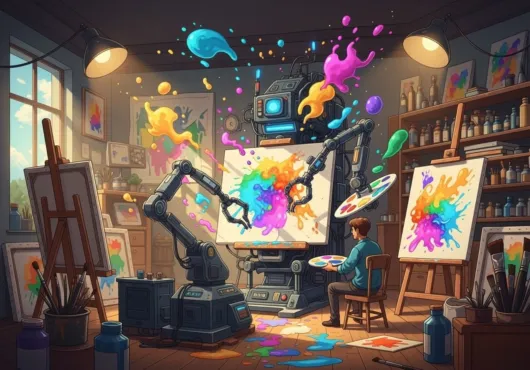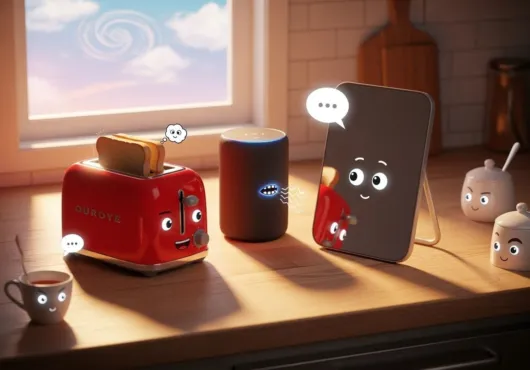Spoiler: that pocket super-coach in your phone might be more Pavlov than Plato.
Still think you’re in control?
AI isn’t magic. But understanding it feels like a superpower. Go deeper with our no-fluff guides and AI literacy tools.
- Robo-coaches break habits by weaponizing dopamine loops—great short-term, addictive long-term.
- Most apps don’t erase vices; they swap them for monetizable micro-obsessions (think ads, streaks, upsells).
- Stay in charge: own your data, audit nudges, and prove you can quit the bot before it quits you.
Welcome to the Age of Push-Notification Pavlov
Remember when self-improvement meant reading a book, maybe journaling, or at worst letting a smug life coach steal your Saturday? Now you get pinged every nine minutes by an app that claims to “optimize your dopamine curve.” Translation: tap here, human, we’ve gamified self-control.
Quit smoking? There’s an AI that tracks your cravings and shames you with real-time lung-damage GIFs.
Scrolling too much? A chrome extension now slaps you with a five-second delay so you feel the shame stew.
Trying to drink more water? Alexa turns into your passive-aggressive mom: “Hydration is life. Drink now.”
We’ve traded willpower for widgets—only to discover every digital leash has a hidden choke chain.
The Science Pitch vs. the Reality Check
| The Promise | The Punch Line |
|---|---|
| 24/7 “personalized coaching” based on biometric sensors. | Personalized… until the algorithm lumps you in with 500k other anxious night-owls and prescribes identical meditation tracks. |
| Adaptive micro-rewards that nudge you toward better choices. | Tech companies rewired slot-machine psychology; you’re basically a rat pressing the lever for digital pellets. |
| Data-driven insights showing triggers you never noticed. | Sure—but it also sells those triggers to advertisers who now know you panic-shop gummy vitamins at 2 a.m. |
Bottom line: The AI knows your routines, but it also knows your weaknesses—because that’s how it pays rent.
Meet the Robo-Reformers
Habit-Stacker 3000
Gamifies your day down to tooth-brushing angles.
Break a streak? It sends you a “shame badge” and a coupon for focus gummies.
CraveCrash
Predicts cigarette triggers with scary accuracy.
Then blasts you with “inspirational” lung-x-rays until you’d kill for a vape just to escape.
Mood-Ring Messenger
Analyzes your tone on Slack, suggests deep-breathing videos when you sound “spiky.”
Coworkers notice the auto-calm replies; you notice a new addiction to curated ASMR.
The Dirty Swap—When One Vice Becomes Another
Bots rarely delete a habit—they swap it for something the algorithm can monetize:
| Old Vice | Algorithmic Substitute | Who Wins? |
|---|---|---|
| Doom-scrolling Twitter | Guided “10-minute news digest” (ad-supported, naturally) | The platform—you still feed the data beast. |
| Stress eating | “Mindful snack tracker” that rewards posting food pics | The AI sells your dietary profile to grocery advertisers. |
| Netflix bingeing | Gamified bedtime stories (“Unlock Episode 2 if you sleep by 10 p.m.”) | Streaming service gets two screens—one while you’re awake, one while you doze. |
Can Bots Actually Fix Anything?
Short-Term Gains: Yes, your steps spike, your nicotine plummets, you feel invincible.
Long-Term Trade-Offs: The AI now owns your routine. Kill the app? Watch your willpower spiral faster than a WeWork IPO.
The Big Risk
Bad bots don’t just break habits—they manufacture new compulsions (notifications, micro-transactions, social validation loops). You escape cigarettes and land in the arms of constant self-optimization FOMO.
If You Must Date a Robo-Coach, Set Ground Rules
Own Your Data: Export weekly. If you can’t, assume they’re hoarding it for ad tech.
Audit the Nudges: Turn off streak counters. Real growth ≠ cartoon progress bars.
Schedule Detox Weeks: If the thought of uninstalling gives you hives, congrats—you’ve discovered dependence.
Celebrate Imperfection: Break the streak on purpose. Prove you’re still the one driving.
Final Take
AI habit apps are basically self-help slot machines: they flash lights, spit rewards, and convince you they’re saving your life. Sometimes they do. But never forget: any tool that rewires your brain can also rewire your purchasing behavior.
Want to get better? Use the bot—but keep one hand on the plug. Because the moment it swaps your bad habit for something profit-positive, congratulations: you’ve been re-educated—just not in the way you planned.



